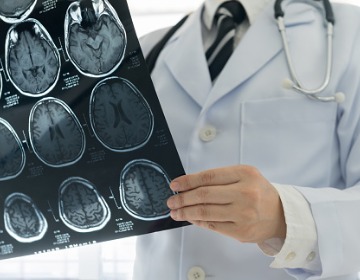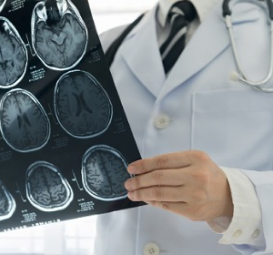 Sadly, serious accidents can lead to a traumatic brain damage & injury. There are many types of accidents that cause a traumatic brain injury (also known as TBI). The most common include motor vehicle accidents, slip and fall, trip and falls, motorcycle and trucking accidents.
Sadly, serious accidents can lead to a traumatic brain damage & injury. There are many types of accidents that cause a traumatic brain injury (also known as TBI). The most common include motor vehicle accidents, slip and fall, trip and falls, motorcycle and trucking accidents.
Because traumatic brain damage & injuries vary in severity, an experienced personal injury lawyer will need to be able to identify if their client has potentially suffered a traumatic brain injury or mild traumatic brain injury. At Carey Leisure Carney, a personal injury firm, we make sure you get to specific medical specialists in your area who can perform a series of tests in order to pinpoint a conclusive diagnosis.
Typically, in a case involving head trauma, the injured victim is taken to the hospital via ambulance or airlifted to the closest trauma hospital. Hopefully, the emergency room doctor will perform the tests you need to evaluate you and properly address your head trauma.
Sometimes, then the doctor orders diagnostics of your brain such as an MRI or CT scan, the findings appear normal. This does not always mean you have has not suffered brain damage as a result of the accident. In fact, we have handled many cases where diagnostic studies are performed and the radiologist have found the test results to be “normal”, but our clients continue to experience head injury symptoms.
An experienced personal injury lawyer that specializes in traumatic brain injuries will know the latest technology that will diagnose a brain injury. For example, SWI and DTI scans can identify the injury and cause of the injury, which very often is the trauma or accident.
Traumatic Brain Injury Symptoms
Some symptoms of traumatic brain damage & injury include:
- Memory or concentration problems, feeling of confusion
- Headaches that are frequent or get worse
- Nausea or vomiting several weeks after the accident
- Sensory problems, such as blurred vision, dizziness, and ringing in the ears
- Sensitivity to light or sound
- Mood changes or mood swings
- Feeling depressed or anxious
- Difficulty sleeping or sleeping more than usual
- Slurred speech or loss of word retrieval
- Weakness or numbness in the extremities
- Loss of coordination, bladder control or bowel control
- Dizziness or loss of balance
Complications From Traumatic Brain Injury
When someone has been involved in a serious accident involving head trauma, they are typically transported from the scene in an ambulance or airlifted to the nearest trauma hospital. Urgency is important in these cases, as the sooner a TBI can be diagnosed the sooner the most appropriate treatment can be administered in an attempt to avoid complications. Trauma to the brain can cause many complications, including:
Altered consciousness – these are prolonged or, in severe cases, permanent damage to a person’s state of consciousness, awareness, or responsiveness. Some examples of altered states of consciousness include:
- Coma
- Vegetative state
- Minimally conscious state
- Brain dead
Physical complications – physical complications can manifest immediately after an accident, or they may take time to appear. They include:
- Headaches. Frequent and severe headaches are common after a traumatic brain injury.
- Vertigo. Many people may experience vertigo after a traumatic brain injury. This is characterized by dizziness, and a feeling of swaying or movement when a person is standing still.
- Seizures. People who sustain traumatic brain injuries may develop seizures.
- Fluid buildup in the brain (hydrocephalus). In instances of severe trauma, cerebrospinal fluid may build up in the spaces between the brain, causing increased pressure and swelling in the brain cavity.
- Infections. When trauma causes skull fractures or debris penetrates the skull, infections can emerge.
- Blood vessel damage. If blood vessels are damaged in a traumatic brain injury, this could lead to blood clots, strokes, and other serious issues.
Burden of Proof in a Traumatic Brain Injury Case
When filing suit for a traumatic brain injury, you will most likely be filing a claim for negligence. In a negligence lawsuit, the plaintiff has the burden of proof to show that the driver who hit them owed them a duty of care, that their driving breached that duty, and that the accident caused them injury, therefore entitling them to damages. If all those elements can be proven, a personal injury attorney will be able to help you seek compensation for your injuries. Typically, victims of traumatic brain injuries will be able to seek economic damages, such as medical bills, lost wages, and bills for physical therapy or other rehabilitation treatments. These claims may also be eligible to seek non-economic damages such as pain and suffering, loss of earning capacity, and loss of companionship, also known as loss of consortium.
Due to the varied nature of TBIs, an experienced personal injury attorney will need to be able to identify if their client potentially suffered a TBI, and recommend medical care and imaging to determine the severity of the injury and any long term effects. This will help ensure that you receive the treatment you need, while also maximizing your claim for compensation. At Carey Leisure Carney, we pride ourselves on making sure our clients seek treatment from specialists who will be able to pinpoint a conclusive diagnosis and create a comprehensive treatment plan.
How Carey Leisure Carney Can Help
If you believe you are suffering from a brain injury as a result of an accident, we will exhaust every effort to recover compensation for medical expenses, lost wages, mental anguish, injuries and pain, and suffering. The insurance companies will more than likely attempt to diminish the value of your claim and offer a minimum settlement. If possible they will challenge the very existence of your brain injury. In this situation, Carey Leisure Carney will file a lawsuit and fight for your right to recovery.
We recommend you visit www.cdc.gov/TraumaticBrainInjury, for more information if you believe you or your a loved one has sustained brain damage or injury.
At Carey Leisure Carney, Thomas Carey, Jodi Leisure, and Matthew Carney are Board Certified in Civil Trial Law. At Carey Leisure Carney we have handled thousands of cases, and you’re not just a client, you’re family.
It is vital that you call a personal injury attorney that has experience with appropriately documenting the evidence of your traumatic brain injury through every stage of treatment. Getting an attorney involved immediately after your accident is critical to ensuring you receive the best possible care, while also preserving your potential claim, as many traumatic brain injuries will require extensive ongoing treatment. At Carey Leisure Carney, our attorneys have nearly 40 years of experience litigating traumatic brain injury cases and have the knowledge and expertise you need to document every step of your treatment to maximize your claim. If you have been involved in a traumatic accident, call the attorneys at Carey Leisure Carney for a free consult today.
Contact us at (727) 799-3900 for a free no-obligation consultation and case evaluation.
